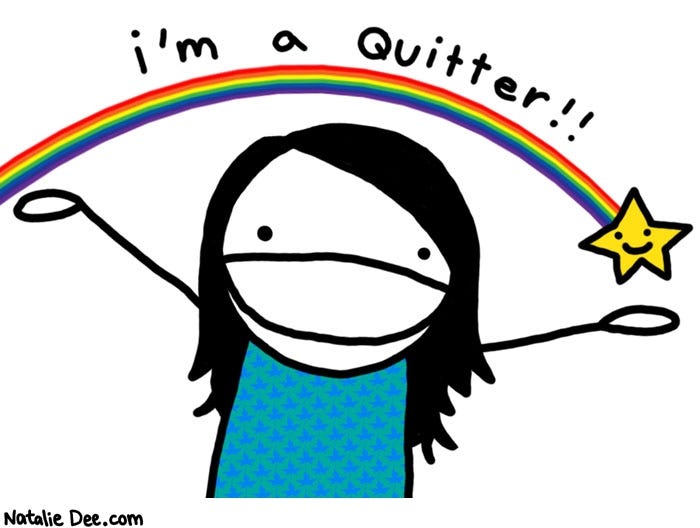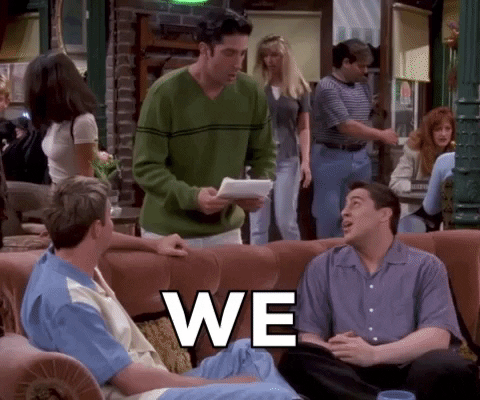In Defense of Le Pause
A case for taking a break from (or quitting!) the book you’re struggling to read
When my husband and I first started dating, one of our earliest fights resulted from my admission that were there to be a zombie apocalypse, I was not going to spend the rest of my days running from the undead. I was genuinely exhausted at the thought of it. Living in a constant state of fear? Running from one place to another with no idea where I’d end up or how long I’d be able to stay—every corner turned a jump-scare? No thank you!
My husband, who loves me and thinks that I am worthy of running and/or fighting for, was incredulous if not a little offended. But kind reader: fifteen years and two kids later, I have not changed my mind.
If you’re wondering what the zombie apocalypse has to do with books, let me tell you: I will give up on a book in a heartbeat if the alternative means forcing myself through prolonged discomfort, pain or uncertainty. If I am simply not feeling it? I quit.
If you are struggling to finish a book—if every time you sit down you are disheartened by what little progress you’ve made since the last time you read, or if you feel like you’re desperate to finish a book you have no interest in so you can move on to the next one—I am here to hold you like a brand new human baby and whisper in your tiny ear: “just stop.”
What is Le Pause?
Le Pause is simply a break. It’s acknowledging that you are stuck getting through a book for whatever reason, and you are honoring that struggle by putting that book down, if only temporarily. It is rejecting the pressure to push through or finish what you started, and allowing yourself the space to open a new book (or no book at all) without guilt or shame.
Here is a foolproof guide to help you determine if you should take Le Pause.
What are you struggling with?
What is preventing you from finishing this book? Is it time? Is it not the right vibe for the moment? Is it … bad?
If your answer is I don’t have enough time, I understand this and I see you. It can be hard to make time for reading even when we truly want to. If you want to finish the book and are simply struggling to find the time or focused attention to read, here are some things you might consider trying:
Switch to an audiobook. Audiobooks, which 100% count as reading thankyouverymuch, are a great way to “read” a book while doing other things that don’t require your undivided attention, like taking a walk, making dinner, cleaning your home or listening to your husband infodump about his myriad strategies for surviving the zombie apocalypse.
Set a timer. Set a timer and use that time for uninterrupted reading. Whether it’s 5 minutes or 30, during a lunch break or in bed before lights-out, do not check your phone, respond to email, doom scroll or call your cable company and try to cancel your cable. Just read.
Try again later. Really. If you’re busy and struggling to find time to read or want to prioritize rest, other hobbies, whatever: that’s okay!
I’m just not feeling it right now.
The emphasis here is on “right now”. If this is a book you know you’d otherwise enjoy but you’re not feeling it right now, take the break. Maybe you’re reading a nonfiction book about the metaphysics of quantum entanglement that you requested from the library two months ago when that subject was all you could think about; but right now, all you want is to curl up with the latest sexy faery fantasy series that is horny as hell. (We contain multitudes.) Honor your cravings. Get that faery D. You don’t want to end up hating a book you might enjoy at another time, just because you insisted on pushing through it now.
I’m struggling with caring about the plot / writing / characters.
This one is pretty easy: Skip Le Pause. Go straight to stop.
Why Are You Reluctant to Pause?
In the early oughts, it is said that Limp Bizkit lead singer Fred Durst bragged about having never read a single book. Whether this is actually true or simply millenial legend, he did have a Tumblr about doing a 60-day juice cleanse in January (nu metal singers: they’re just like us!). [Ed. note: please please do not do a 60 day juice cleanse.]
Why am I talking about Fred Durst in a newsletter about books? Because just in case you were worried: taking any kind of break from reading, whether it be a month or a year, does not a Durst make.
So what actually is the worst thing that could happen if you took a break from reading?
What if I come back to the book but have forgotten everything?
If this is truly a concern, write some key plot points or character summaries on a piece of paper, fold it up into a bookmark, and put it in the book before it goes back on the shelf. That way, not only have you saved your place, but with a few facts to jog your memory.
What if I never come back to it?
If you never come back to it, it was probably worth putting down.
But everyone loves this book. Is there something wrong with me?
Not every book is for everyone. Sometimes the right book finds you at the wrong time—try again later. Sometimes the format is the problem, and you need to switch from audiobook to ebook or hard copy, or vice versa. But also? It’s okay to hate popular books. In my house I have taught my very particular eater of a son to say “this is not for me” instead of yelling “TRAAAAASH” every time he is given a plate of food he has no desire to eat. Maybe this book is, simply, trash not for you.
What if I hate it and want to quit, but the last third is INCREDIBLE and I’ll never know?
This is a really good question and I’ve been there. (Trigger warning for ableism up ahead!)
A few months ago I found myself halfway through a book when I could not imagine going any further. While the book had been pitched as a courtroom whodunnit, it quickly became clear it was a book that, at best, was about mothers desperate to cure their children’s Autism (an impossible and offensive endeavor), and at worst, a mother possibly willing to sabotage a hyperbaric chamber used to try and cure her Autistic child in order to kill said Autistic child.
This book enraged me. I am open to a world where main characters are terrible people. A book with problematic characters or characters with dangerous and offensive opinions isn’t inherently a bad book; but the unspoken agreement is that there has to be a voice of reason, or it must be obvious to the reader that the opinions in question are dangerous and/or offensive. This book didn’t have any of that. Instead it had highly researched explanations of how these “cures” worked. It even had a defense attorney that eventually brings up—and I wish I was joking when I tell you this—vaccines. (There was a group of protesters who protested the facility where the “cure” was administered, who insisted that disabled children should instead be supported and affirmed as they are. They were portrayed as violent, irrational, and possibly capable of murder.)
“This author can suck my dick” is a thing that I said out loud to no one as I finally put the book down. And yet, in spite of all of this, I still wondered: what if this book redeems itself in the last half?
Whew.
Here’s what I did: I searched for one-star reviews for the book on a few book review sites. In those I found folks that had finished the book and confirmed my suspicions: not a single character advocates for the disabled children or calls out the ableism. I closed the book and never looked back.
What was the book?
Oh my god you’re so bad! Sorry, but I’m not going to use this Substack to shit on books.
It was Miracle Creek by Angie Kim.









I was very glad to read this and now feel less guilty about my stack of unfinished books. I especially appreciate your advice about checking the one star reviews to confirm suspicions about why I had to abandon the story. Also, I am contemplating my path of action in a zombie apocalypse and I will not be ashamed about being a quitter. Thank you!